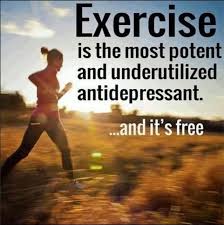
Imagine going to the doctor with symptoms of depression and she hands you a new prescription: Do two sets of squats, 15 bicep curls, 10 laps around the track and call me in the morning. Though this is not (yet) an accurate picture, experts are starting to recognize that regular exercise is not only good for your mood, but may help combat depression, too.
According to the National Institutes of Health, in 2015 an estimated 16.1 million adults aged 18 or older in the United States had at least one major depressive episode within the past year. This number represented 6.7% of all U.S. adults. The Center for Disease Control & Prevention states that 10.3 percent of physician office visits in the U.S. indicate depression on the medical record as one of the issues discussed during the encounter. Sometimes life stressors can trigger depressive symptoms in individuals. Other medical conditions such as endocrine and reproductive system disorders are commonly associated with depressive symptoms. Anxiety disorders and depression are also frequently interrelated.
The symptoms of major depressive disorder, the most common type of depression, range from an overwhelming feeling of sadness and loss of interest in most activities to altered sleep patterns and cognitive difficulties such as diminished ability to think, concentrate and make decisions. Other symptoms that are associated with major depression include decrease or increase in appetite, constant fatigue, feelings of worthlessness or excessive and inappropriate guilt, and possibly recurrent thoughts of death and/or suicide. In a major depressive episode, symptoms persist for two weeks or longer and represent a significant change from previous functioning. Social, occupational, educational, and other important functioning are also impacted. (Visit the Anxiety and Depression Association of America for more information on symptoms and how they often differ in people of varying age and gender.)
Medications—including antidepressants such selective serotonin reuptake inhibitors (SSRIs)—and psychotherapy are common options for treatment of depression. Experts are now also singing the praises of a cheap and easy alternative: EXERCISE.
Many experts are studying whether exercise, either alone or in combination with other treatments, can help those suffering from depression. A review study published in the American College of Sports Medicine’s Health & Fitness Journal titled “Is Exercise a Viable Treatment for Depression?” examined evidence and concluded that exercise is a comparable alternative to pharmacotherapy and psychotherapy. According to the study’s authors, observational studies show that active people are less likely to be depressed, and interventional studies indicate that exercise can reduce the signs of depression.
While you don’t need to be a fitness fanatic to reap the benefits of exercise, you do need to make sure that you are following a safe and effective program. For those considering exercise as a treatment for depression, it is important to discuss your options with a physician. Physical therapists can also serve as a great resource for those looking to adopt a more active lifestyle. These rehabilitation professionals are trained to teach patients how to utilize exercises and lifestyle changes to prevent or combat injuries and to improve overall health and well-being.
For patients suffering from depression, it can be stressful and overwhelming to think about incorporating exercise into their lives – either for the first time or after a long hiatus. Because the illness’ symptoms often include fatigue and loss of interest in activities, it can be difficult for patients to take that first step, both literally and figuratively. But physical therapists excel in motivating patients to perform exercises both safely and effectively. In fact, another bonus of seeing a physical therapist to get started on a new exercise program is that he or she is trained to identify other injuries or illnesses that might also benefit from treatment.
Though growing numbers of experts agree that exercise is a great tool in combatting depression, the exact physical reasons why still elude us. Some researchers believe exercise works by increasing the production of serotonin—the neurotransmitter that antidepressants target. Others believe that exercise helps people sleep better, which can have a protective effect on the brain. On the psychological front, exercise may improve a depressed person’s outlook on life by boosting confidence through a return to normal activities.
A physical therapist will work with you to find to a suitable and safe exercise program, one that takes all of an individual’s illnesses or injuries into consideration. Even minimal changes in any of these conditions could change your outlook on the day and your ability to participate in activities you once enjoyed. So, what are you waiting for? Give exercise a try!
